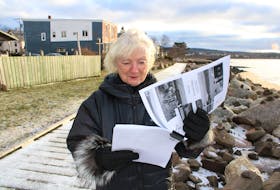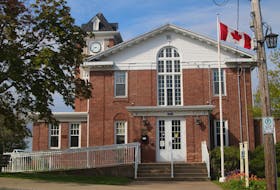The launch of Atlantic Canada’s first seed bank took place on Monday at the Bible Hill campus, which allows for long-term storage of high-quality seeds that hold cultural and historical value in the area.
“A seed bank has a basic benefit, which is to conserve genetic resources,” said Stephanie Hughes, regional co-ordinator of the Bauta Family Initiative on Canadian Seed Security.
The seed bank, a partnership between Dalhousie, Bauta and Seeds of Diversity Canada, will be located in the plant and animal sciences department.
It currently holds 24 varieties of 10 vegetable and grain crops, which will be made available to farmers and others who wish to access seed for trialing, research and on-farm adaptation.
“With climate change, the growing conditions are being altered, and so having this base of conserved seed allows growers access to more,” said Hughes. “So they can say, ‘Well geez, this tomato I’ve been using for 20 years is not cutting it anymore. Where can I go to figure out something else?’ And they could go to seed companies – that’s a perfect viable option, but now they have another option, which is coming here.”
Not only will growers benefit from the seed bank, but Dalhousie students will also have the opportunity gain valuable, hands-on experience, said Hughes.
“We’re at a hub where there are thousands of students, many of whom are studying plant sciences and agriculture, so it’s really key to have the collection here because students can help maintain the collection by growing it out. They can also use it for their research purposes, which will help tell us more about the seeds we are storing here.”
Nancy MacLean, an assistant professor in the plant and animal sciences department, will oversee the seed bank and dedicate her time to preserving the genetic purity of the collection.
“She is extremely knowledgeable about genetic purity and about how seeds need to be managed, so she’s been a really key partner,” said Hughes.
Seeds for the seed bank will be supplied by growers. They will be tested for germination, cleaned, dried and stored. Half of the seed will be placed in long-term storage in a freezer, while the other half will be on a shelf at the ready when requested by growers.
The seed bank at Dalhousie comes after the agricultural campus launched a seed lending library last March. The initiative, named Seeding Ideas, provided access to a collection of non-hybrid, non-genetically modified seeds that were borrowed by members of the community. Members grew the seeds and enjoyed their harvest while letting a few plants return to seed. These new seeds were then returned to the library for the next growing season’s collection.
“So what better time to deepen the university’s commitment to this important issue through the establishment of the centrally located seed bank,” said David Gray, principal of Dalhousie Agricultural Campus.
“Though the projects are different and were conceived of independently, the driving force behind them is the same. There is clearly an energy around local seed that we cannot ignore.
“So bringing together education and training, research and innovation and engagement with farmers and farming communities is natural fit for Dalhousie University and particularly the faculty of agriculture, and we are very proud indeed to help make this happen on our campus.”
Twitter: tdnJoey
The launch of Atlantic Canada’s first seed bank took place on Monday at the Bible Hill campus, which allows for long-term storage of high-quality seeds that hold cultural and historical value in the area.
“A seed bank has a basic benefit, which is to conserve genetic resources,” said Stephanie Hughes, regional co-ordinator of the Bauta Family Initiative on Canadian Seed Security.
The seed bank, a partnership between Dalhousie, Bauta and Seeds of Diversity Canada, will be located in the plant and animal sciences department.
It currently holds 24 varieties of 10 vegetable and grain crops, which will be made available to farmers and others who wish to access seed for trialing, research and on-farm adaptation.
“With climate change, the growing conditions are being altered, and so having this base of conserved seed allows growers access to more,” said Hughes. “So they can say, ‘Well geez, this tomato I’ve been using for 20 years is not cutting it anymore. Where can I go to figure out something else?’ And they could go to seed companies – that’s a perfect viable option, but now they have another option, which is coming here.”
Not only will growers benefit from the seed bank, but Dalhousie students will also have the opportunity gain valuable, hands-on experience, said Hughes.
“We’re at a hub where there are thousands of students, many of whom are studying plant sciences and agriculture, so it’s really key to have the collection here because students can help maintain the collection by growing it out. They can also use it for their research purposes, which will help tell us more about the seeds we are storing here.”
Nancy MacLean, an assistant professor in the plant and animal sciences department, will oversee the seed bank and dedicate her time to preserving the genetic purity of the collection.
“She is extremely knowledgeable about genetic purity and about how seeds need to be managed, so she’s been a really key partner,” said Hughes.
Seeds for the seed bank will be supplied by growers. They will be tested for germination, cleaned, dried and stored. Half of the seed will be placed in long-term storage in a freezer, while the other half will be on a shelf at the ready when requested by growers.
The seed bank at Dalhousie comes after the agricultural campus launched a seed lending library last March. The initiative, named Seeding Ideas, provided access to a collection of non-hybrid, non-genetically modified seeds that were borrowed by members of the community. Members grew the seeds and enjoyed their harvest while letting a few plants return to seed. These new seeds were then returned to the library for the next growing season’s collection.
“So what better time to deepen the university’s commitment to this important issue through the establishment of the centrally located seed bank,” said David Gray, principal of Dalhousie Agricultural Campus.
“Though the projects are different and were conceived of independently, the driving force behind them is the same. There is clearly an energy around local seed that we cannot ignore.
“So bringing together education and training, research and innovation and engagement with farmers and farming communities is natural fit for Dalhousie University and particularly the faculty of agriculture, and we are very proud indeed to help make this happen on our campus.”
Twitter: tdnJoey








